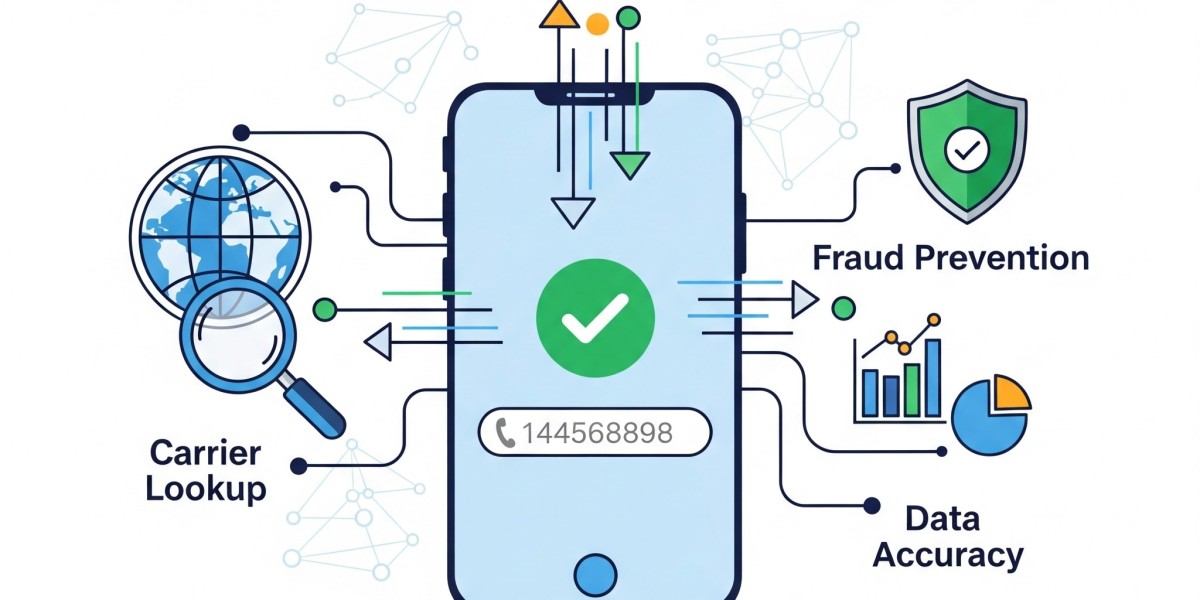Phone numbers are more than just contact details, they’re identifiers, verification tools, and gateways to secure communication. Whether you're running a fintech app, a CRM platform, or an e-commerce store, the accuracy and legitimacy of phone number data directly impact user experience, fraud prevention, and operational efficiency.
That’s where an API number lookup and a carrier lookup API come into play. These APIs empower businesses to validate, enrich, and analyze phone numbers in real time, ensuring that every number in your system is accurate, reachable, and trustworthy.
This article explores how these APIs work, why they’re essential, and how integrating them into your tech stack can transform your business operations.
? What Is an API Number Lookup?
An API number lookup is a tool that enables developers and businesses to verify and format phone numbers programmatically. It checks whether a number is valid, identifies its type (mobile, landline, VoIP), and ensures it’s formatted correctly for international communication.
Key Features:
Number validation
Line type detection
Country and location identification
Formatting in E.164, national, and international formats
By integrating an API number lookup, businesses can eliminate fake or mistyped numbers, reduce failed communications, and streamline user onboarding.
? What Is a Carrier Lookup API?
A carrier lookup API provides enriched metadata about a phone number by querying telecom databases to identify the carrier and network type. It’s especially useful for fraud detection, lead scoring, and personalized marketing.
Key Capabilities:
Carrier name (e.g., AT&T, Vodafone)
Network type (GSM, CDMA, LTE)
Ported status (whether the number has been transferred)
Risk indicators (e.g., spam or fraud potential)
This API helps businesses understand the infrastructure and context behind each number, enabling smarter engagement strategies and improved security.
? Why Businesses Need These APIs
✅ 1. Improve Data Accuracy
Incorrect or fake phone numbers can lead to failed communications, wasted resources, and poor customer experiences. These APIs ensure that your database is clean and reliable.
✅ 2. Prevent Fraud and Spam
By identifying suspicious or high-risk numbers, businesses can block fraudulent activity before it happens. This is crucial for industries like banking, insurance, and e-commerce.
✅ 3. Enhance User Experience
Verified numbers mean smoother onboarding, faster communication, and fewer failed SMS or call attempts. It’s a win-win for both businesses and users.
✅ 4. Optimize Marketing Campaigns
Knowing the carrier and line type allows marketers to tailor messages, segment audiences, and improve conversion rates.
✅ 5. Streamline Compliance
For businesses operating under GDPR, TCPA, or other data regulations, verifying phone numbers helps ensure lawful communication practices.
? Use Cases Across Industries
?️ E-Commerce
Validate customer numbers during checkout to reduce delivery errors and enable SMS order updates.
? Fintech
Prevent fraud by validating phone numbers during account creation and transaction verification.
? Healthcare
Ensure accurate patient contact information for appointment reminders and telehealth services.
? Call Centers
Use carrier lookup API to identify caller details and route calls more efficiently.
? Marketing Agencies
Segment leads based on carrier, location, or line type to improve targeting and ROI.
How to Integrate These APIs
Integrating an API number lookup or carrier lookup API is straightforward and developer-friendly. Most providers offer RESTful endpoints with JSON responses.
Basic Steps:
Sign Up for an API provider like Numverify.
Get Your API Key for authentication.
Make a Request to the verification or lookup endpoint.
Parse the Response to extract relevant data.
Use the Data to validate, enrich, or flag phone numbers in your system.
Here’s a sample request:
bash
GET https://api.numverify.com/validate?access_key=YOUR_API_KEY&number=+14158586273
And a sample response:
json
{
"valid": true,
"number": "+14158586273",
"local_format": "4158586273",
"international_format": "+14158586273",
"country": "United States",
"location": "San Francisco",
"carrier": "AT&T",
"line_type": "mobile"
}
FAQs
Q1: What’s the difference between an API number lookup and a carrier lookup API?
An API number lookup checks if a number is valid and reachable. A carrier lookup API provides additional metadata like carrier name and network type.
Q2: Is it legal to use these APIs for marketing?
Yes, as long as you comply with data protection laws like GDPR and TCPA. Always obtain user consent before sending messages.
Q3: Can these APIs detect VoIP or burner numbers?
Absolutely. They can identify line types and flag numbers that may be temporary or high-risk.
Q4: How accurate is the data returned by these APIs?
Accuracy depends on the provider’s data sources. Reputable APIs like Numverify use carrier-level data and global telecom databases.
Q5: Do these APIs support international numbers?
Yes. Most APIs support global number formats and can validate numbers from over 200 countries.
Smarter Communication Starts with Smarter Data
In a world where communication is instant and data is king, verifying phone numbers is no longer optional, it’s essential. Whether you're protecting your platform from fraud, improving customer engagement, or optimizing marketing efforts, integrating an API number lookup and a carrier lookup API gives you the edge.
These tools are fast, scalable, and easy to implement, making them ideal for businesses of all sizes. From startups to enterprises, the benefits are clear: better data, better decisions, and better outcomes.
Ready to take control of your phone number data?
Explore the power of real-time verification and lookup with Numverify’s API number lookup and carrier lookup API. Start your free trial today and see how smarter data can transform your business.








